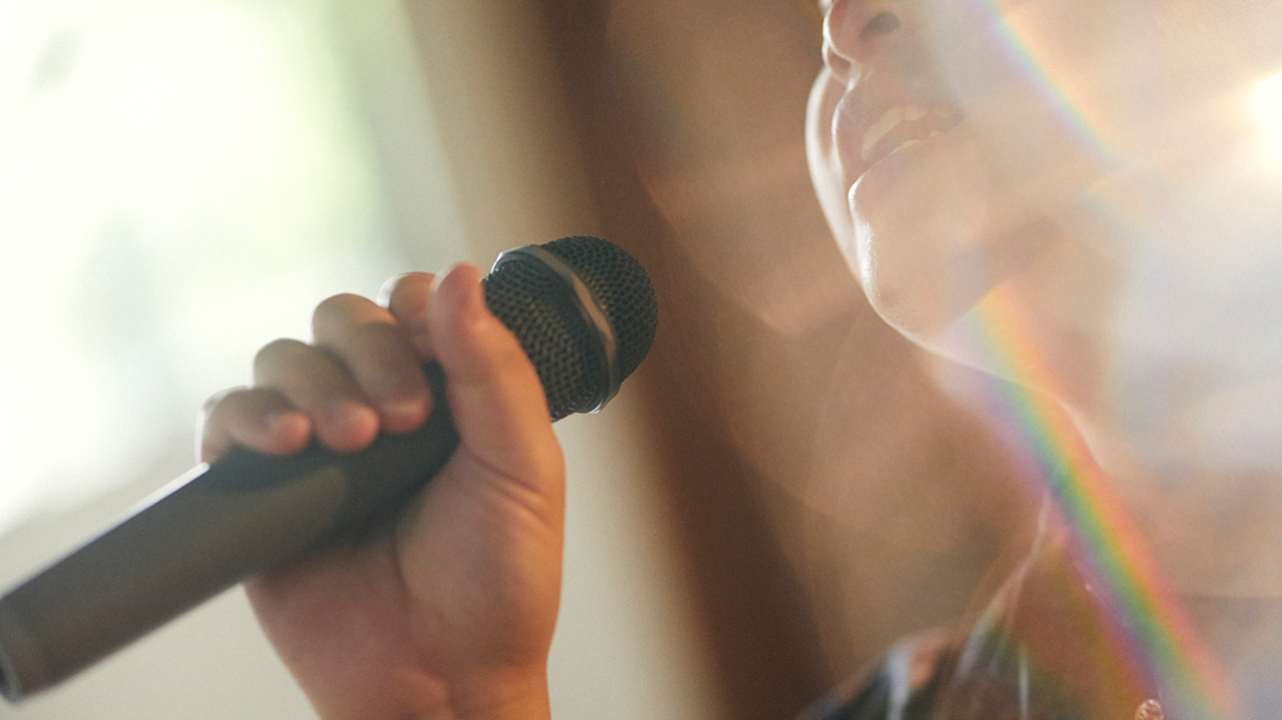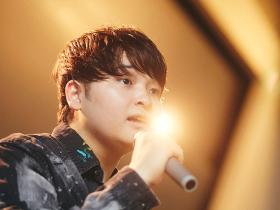Making a life as a singer
Aiki Azukizawa has been living with songs since he was two years old. “I have never been unhappy singing,” he says, showing the extent to which song is a part of his daily life. Three years ago, he entered Meiji Gakuin University while wondering what he will require to make a life as a singer. Here he reflects on his student life, a cycle of learning and practice, and talks about the significance of living as a singer.


Aiki Azukizawa
Fourth-year student, Department of Art Studies, Faculty of Letters
Influenced by his mother, a former singer who now runs a karaoke school, Aiki Azukizawa started singing when he was two years old. He has many accomplishments, including being the champion in Nippon TV’s second annual All-Japan Singing Championship and being a finalist in the seventh contest. He was also the first under-18 male singer to score a perfect 100 points on TV Tokyo’s “The Karaoke Battle.” He is currently active on YouTube and he continues to train every day. His hobby is going to Tokyo Disneyland, to the extent that he sometimes goes in the morning to watch the parade before his classes start.
I wanted to enter college, but…
I’d been involved in music since before I started college, but I was pretty sure just liking music wouldn’t be enough to make a career out of it. I knew I had some skill in singing, but I wasn’t sure what I should do to improve that skill. I wanted to enter college, but I wasn’t sure if that would provide me with the answers I needed. What I wanted to do felt very different from playing an instrument or drawing pictures. I spent much of my time in high school worrying about such things.
So I was feeling a gap between what I thought I needed and what I expected college to provide, which made my surprise all the larger when I learned about the Department of Art Studies at Meiji Gakuin University, which takes a multidisciplinary approach that teaches the theory, history, and culture of art. I was also surprised to learn that the department wasn’t part of a school of arts, but in their Faculty of Letters. The curriculum would provide me a broad range of studies, including art theory and history, not just deep studies in the specific field where I wished to become an artist. Seeing this is what made me want to go to college, and very much so.
The day after filming for a television show, I visited Meiji Gakuin’s Shirokane campus to get a feel for what it was like. I also started performing some information gathering on the Department of Art Studies and prepared for entrance exams. In a show that I recorded after passing those exams I got to meet Toshihiko Takamizawa, a Meiji Gakuin alum and member of folk-rock band The Alfee, and I told him I would be going to the same college as he did. When we met again on the set of another show about two years later, he said, “You’re the one who’s going to Meiji Gakuin, right? I remember that song you sang!” I was so happy he remembered me, and I can recall that experience like it was yesterday.

Unraveling and reconstructing the daily reality of studios
It seems that many students in the Department of Art Studies, myself included, are strongly committed to what I think of as their own pillar. This varies by person, such as their attitude and motivation for study, or their clothing or what have you, but common among them all is their strong interest in art itself.
The Department of Art Studies provided me with opportunities to meet new people, such as the friend who always plays piano for me during concerts, but it also allowed me to learn many new forms of art. One example is the cinematography skills I learned from Professor Roland Domenig as a first-year student in his Introduction Study of Image & Meaning P course. If you want to express heightened emotions, he taught us, you use a handheld camera, and if you want to show a certain level of quality, you use a stabilizer. I’d been appearing in television shows since I was in high school, so I’d previously had opportunities to meet studio camera operators, but I had always just considered cameras to be part of the studio scenery. By learning such things, I became able to see things from the perspective of those putting their all into the creation of a video work, and to appreciate the importance of their attitudes and passions toward doing so.
As I put my daily learning into practice through my singing, and feel myself improving, I confirm to myself that the Department of Art Studies was the right choice. What I have learned here has allowed me to unravel and deconstruct the daily reality of studios, which before had all seemed like a single lump to me.
Running a never-ending marathon
In order to sufficiently apply what I’ve learned in college, I have to practice every day. I practiced at karaoke places almost every day before the Corona-19 pandemic, but now I have to practice at home. This has helped me realize the wonderful environment I’d taken for granted before, but one big difference now is that I’m no longer able to have live performances in front of an audience. I’m therefore putting more effort into broadcasting performances online. To do so, I had to prepare a lot of equipment, including a camera, a tripod, and lighting, and I had to do everything on my own, so learning to record everything was a big struggle. In doing so, however, I learned how difficult yet valuable it is to create an artistic work. I started broadcasting through my own YouTube channel, and held online talks with fans via Zoom. I’m planning to host a hybrid in-person/online live performance in October 2021, in which we will adhere to strict anti-infection protocols.
It’s hard to know the extent to which you’re reaching your audience when you’re singing through a screen, meaning it’s hard to know what feelings and emotion I need to put into my songs. As a singer, I am returning to my starting point and fully devoting myself to each song. Thankfully, I’ve had increasingly many opportunities for hearing words of thanks from listeners, such as “Hearing this in the morning gave me the strength to go to work” and “Your music makes me forget bad things.” I recently saw my parents crying while they listened to me singing, the first time I’ve ever seen anything like that. They had heard me sing many times before, but I’d never made them cry, so I took that in a positive way, as proof I was getting better.

Making a life as a singer
The COVID-19 pandemic has given me time to face myself and think about the future, and doing so has allowed me to confirm that I want to make a life as a singer. I guess my interpretation of Meiji Gakuin University’s educational philosophy “Do for Others” is that I should continue singing for others. I want my music to make others happier, and to give them emotional support. I believe it was because of a student life in which I could learn new things and put them into practice that I was able to find meaning in my singing.
I won’t be a college student for much longer, but I will keep on singing!
